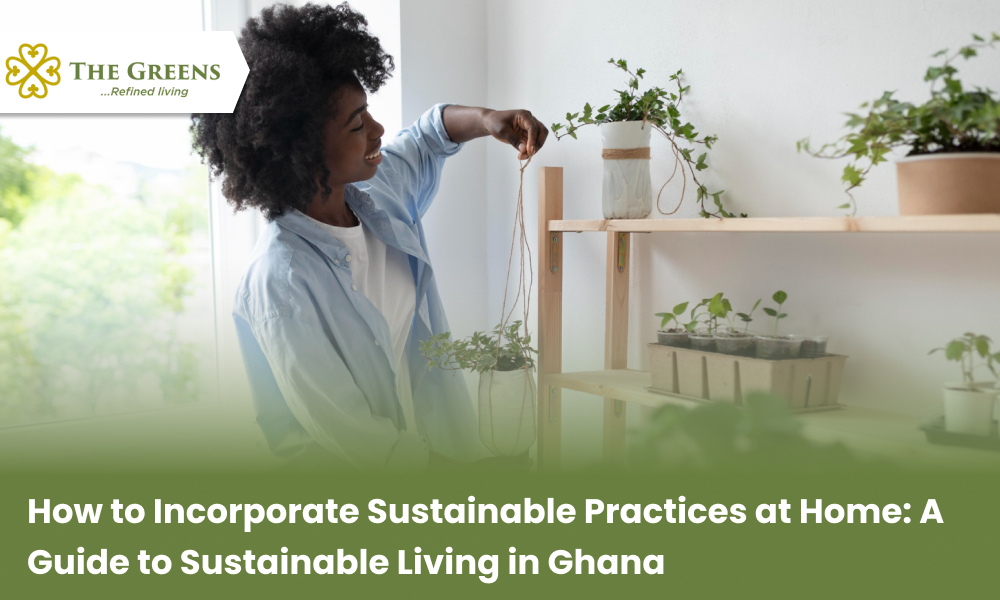In today’s world, sustainable living isn’t just a trend—it’s a necessity, especially in countries like Ghana where the environment and resources are under pressure. Adopting eco-friendly practices at home is a powerful way to contribute to the planet’s health while also improving your quality of life. This how-to guide will walk you through practical steps to make your home more sustainable, with insights from Ghanaian residents who have successfully integrated these practices into their daily lives, particularly in Tema.
Introduction: The Importance of Sustainable Living in Ghana
Sustainable living is all about making choices that reduce your environmental impact. In Ghana, where the effects of climate change are increasingly evident, adopting eco-friendly practices at home is more important than ever. Whether you live in a bustling city like Accra, a developing area like Tema, or a rural community, sustainable living can help preserve the environment for future generations, reduce utility costs, and create healthier living spaces.
Energy Efficiency: Reducing Your Carbon Footprint
Energy efficiency is a cornerstone of sustainable living, and it’s particularly relevant in Ghana, where electricity costs are high and energy resources are sometimes limited. By making your home more energy-efficient, you not only lower your carbon footprint but also save money.
Practical Tips for Energy Efficiency
Switch to LED Bulbs: LED bulbs use up to 75% less energy than traditional incandescent bulbs and last much longer. This simple switch can significantly reduce your electricity bill.
Unplug Devices: Many electronics draw power even when they’re turned off. Unplugging devices when not in use or using power strips to easily turn them off can reduce this “phantom” energy consumption.
Install Solar Panels: Solar energy is abundant in Ghana, making it an ideal solution for reducing reliance on the grid. While the initial investment might be high, the long-term savings and environmental benefits are substantial.
Success Story: Solar Power in Tema
In Tema, a family decided to go solar after facing frequent power outages and rising energy costs. They installed solar panels on their roof, and within a year, they had reduced their electricity bill by over 60%. Not only did they gain energy independence, but they also inspired their neighbors to explore renewable energy options, creating a ripple effect of sustainability in their community.
Waste Reduction: Minimizing Environmental Impact
Waste reduction is another key aspect of sustainable living. In Ghana, where waste management systems are often overwhelmed, reducing the amount of waste you generate is crucial.
Practical Tips for Waste Reduction
Composting: Start composting organic waste like vegetable peels and eggshells. Composting turns kitchen scraps into nutrient-rich soil, perfect for gardening.
Reduce Single-Use Plastics: Bring your own bags when shopping, and choose products with minimal packaging. Opt for reusable containers instead of disposable ones.
Recycle: While recycling options may be limited in some areas of Ghana, many communities are starting to adopt recycling programs. Research local recycling initiatives and participate to keep recyclable materials out of landfills.
Success Story: Community Composting in Tema
In Tema, a group of residents initiated a community composting project. They collect organic waste from their homes and local markets, turning it into compost that’s used in community gardens and for landscaping in public spaces. This initiative has not only reduced waste but also brought the community together, fostering a collective sense of responsibility for the environment.
Water Conservation: Protecting a Precious Resource
Water is a vital resource, and conserving it is essential for sustainable living, especially in regions where water can be scarce.
Practical Tips for Water Conservation
Install Low-Flow Fixtures: Low-flow showerheads and faucets reduce water usage without compromising performance. They’re easy to install and can save thousands of liters of water each year.
Fix Leaks: A dripping faucet might seem minor, but it can waste significant amounts of water over time. Regularly check and repair leaks to prevent unnecessary water loss.
Harvest Rainwater: Installing a rainwater collection system allows you to use rainwater for gardening, flushing toilets, and even washing clothes, reducing your dependence on municipal water supplies.
Success Story: Rainwater Harvesting in Tema
A school in Tema implemented a rainwater harvesting system to address water shortages and reduce its environmental impact. The collected rainwater is used for irrigation, sanitation, and even during school activities. This initiative not only helps conserve water but also serves as an educational tool for students, teaching them the importance of sustainable practices from a young age.
Sustainable Product Choices: Supporting Eco-Friendly Consumption
Choosing sustainable products is a simple yet effective way to reduce your environmental impact. By opting for items that are made from natural or recycled materials, you support eco-friendly practices and reduce waste.
Practical Tips for Choosing Sustainable Products
Buy Locally-Made Goods: Local products typically have a lower carbon footprint than imported ones. Plus, buying local supports the Ghanaian economy.
Choose Natural Materials: Opt for products made from bamboo, wood, or recycled materials instead of plastic. These materials are often more durable and environmentally friendly.
Use Reusable Items: Replace single-use items like plastic bags and bottles with reusable alternatives. This simple switch can significantly reduce the amount of waste you produce.
Success Story: Eco-Friendly Homes in Tema
In Tema, a couple built their home using locally sourced, sustainable materials. They chose bamboo for flooring and furniture, recycled metal for roofing, and used natural dyes for paint. Their eco-friendly home has become a showcase in the community, inspiring others to adopt similar practices and demonstrating that sustainable living is not only possible but also beneficial.
Growing Your Own Food: Reducing Your Carbon Footprint
Growing your own food is one of the most rewarding ways to embrace sustainable living. It reduces your carbon footprint, ensures you have access to fresh, organic produce, and can even save you money.
Practical Tips for Growing Your Own Food
Start a Garden: Whether you have a large backyard or just a small balcony, you can grow herbs, vegetables, and fruits. Start with easy-to-grow plants like tomatoes, basil, and peppers.
Use Compost: Enhance your garden’s productivity by using compost made from your kitchen waste. Composting enriches the soil and helps your plants thrive.
Choose Native Plants: Native plants are adapted to the local climate and require less water and care than non-native species, making them a sustainable choice for your garden.
Success Story: Urban Gardening in Tema
In Tema, a community initiative transformed unused land into a thriving urban garden. Residents grow everything from leafy greens to peppers, sharing the produce among themselves and selling the surplus at local markets. This project not only brings fresh, affordable food to the community but also reduces the need for imported produce, lowering the community’s overall carbon footprint.
Educating Your Family: Making Sustainability a Shared Goal
Sustainable living is most effective when everyone in the household is on board. Educating your family about the importance of sustainability and encouraging them to adopt eco-friendly habits ensures that these practices become a permanent part of your lifestyle.
Practical Tips for Educating Your Family
Create a Family Challenge: Turn sustainable living into a fun challenge. See who can reduce their energy use the most or generate the least amount of waste in a week.
Lead by Example: Children learn by watching. When they see you making sustainable choices, they’re more likely to adopt those behaviors themselves.
Celebrate Achievements: Recognize and celebrate your family’s sustainable living milestones, whether it’s completing a composting project or reducing water usage.
Success Story: A Family’s Journey to Sustainability in Tema
In Tema, a family committed to reducing their environmental impact by making small changes in their daily lives. They switched to LED lighting, started composting, and reduced their plastic use. Over time, these small changes added up, leading to significant savings on their utility bills and a noticeable reduction in their household waste. Their journey has inspired neighbors and friends to make similar changes in their own homes.
Embrace Sustainable Living Today
Incorporating sustainable practices at home is not just about protecting the environment—it’s about creating a healthier, more cost-effective, and fulfilling lifestyle. By making small changes like improving energy efficiency, reducing waste, conserving water, choosing sustainable products, growing your own food, and educating your family, you can make a significant impact.
Now is the time to start your journey towards sustainable living in Ghana, particularly in growing communities like Tema. Every step you take not only benefits you and your family but also contributes to a more sustainable future for all.
Are you ready to embrace a greener lifestyle? Share your own sustainable living tips or experiences in the comments below. For more insights and inspiration, visit The Greens Estate Blog, where you can learn more about eco-friendly homes and sustainable practices in Ghana. Let’s work together to create a brighter, greener future!


